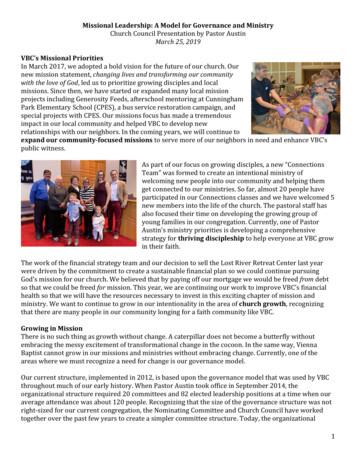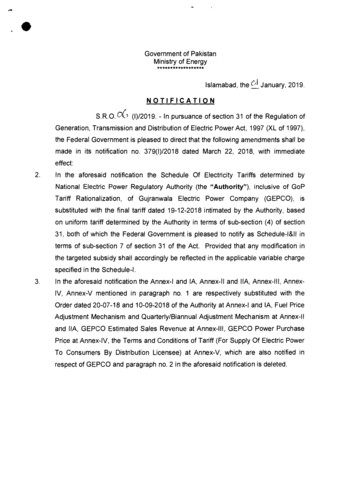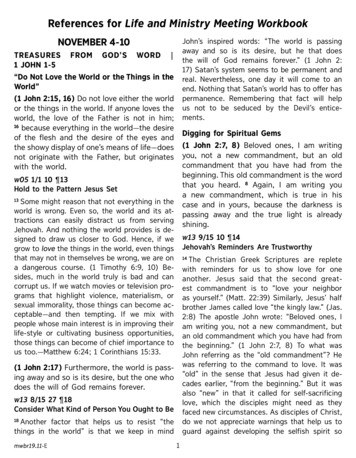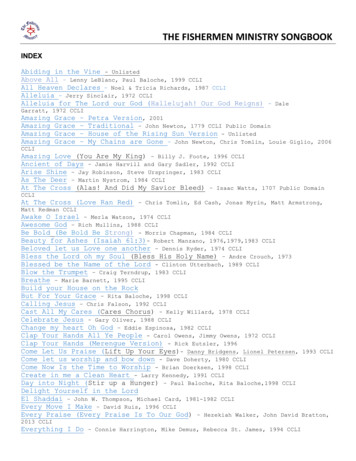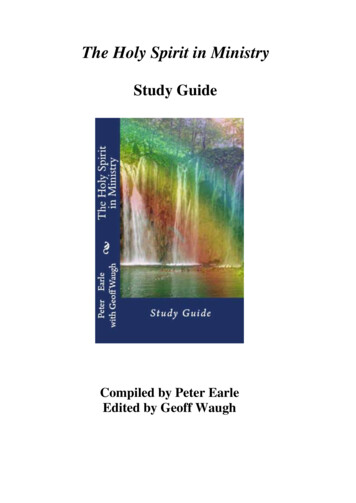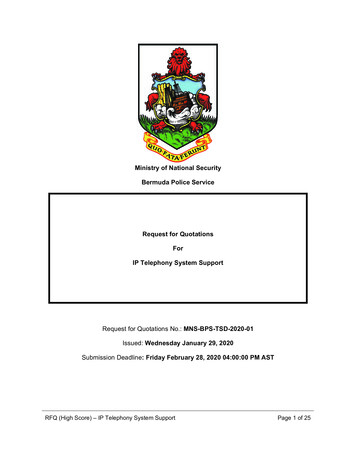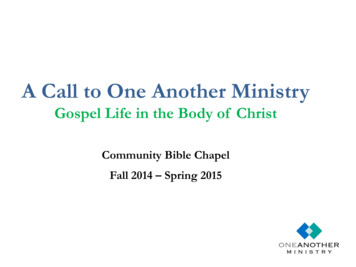
Transcription
YOUCATYouth Catechism ofthe Catholic Church
YOUCATENGLISHYOUTH CATECHISMOF THE CATHOLIC CHURCHWith a Forewordby Pope Benedict XVITranslated by Michael J. MillerIGNATIUS PRESSSAN FRANCISCO
Original German edition:YOUCAT deutschJugendkatechismus der Katholischen Kirche 2010 by Pattloch Verlag GmbH & Co. KG, Munich, GermanyNihil Obstat, March 3, 2010Austrian Bishops’ Conference Imprimatur, Austrian Bishops’ Conference with the approval of theGerman Bishops’ Conference, November 29, 2010; the Swiss Bishops’ Conference, December 6,2010 with the prior approval of the Congregation for the Doctrine of the Faith, the Congregation forthe Clergy, and the Pontifical Council for the Laity.Instructions for UseThe Youth Catechism, which is written in language suitable for young people, deals with the entireCatholic faith as it was presented in the Catechism of the Catholic Church (CCC of 1997), withoutaiming, however, at the completeness provided in that volume. The work is structured in Questionand-Answer format, and numbers after each answer refer the reader to the more extensive and indepth treatments in the CCC. A commentary following the answer is meant to give the young personadditional help in understanding the questions that are discussed and their significance in his life.Furthermore, the Youth Catechism offers in the margin a continuous series of supplementary elements,such as pictures, summary definitions, citations from Sacred Scripture, quotations from saints andreliable teachers of the faith but also from non-religious authors. At the conclusion of the book,there is an index of subjects and persons to facilitate finding specific topics.Symbols and Their Meaning:Citation from Sacred ScriptureQuotations from various authors, including saints and other Christian authorsDefinitionsCross reference to additional texts in YOUCAT See definition given for the termLayout, Design, Illustrations by Alexander von Lengerke, Cologne, Germany 2011 by Ignatius Press, San FranciscoAll rights reserved
ISBN 978-1-58617-516-0Library of Congress Control Number 2010931314Printed in the United States of America
CONTENTSFOREWORDLetter from Pope Benedict XVIPART ONEWhat We BelieveWhy We Are Able to Believe Man Is Receptive to God God Approaches Us Men Men Respond toGod The Christian Profession of Faith I Believe in God the Father I Believe in Jesus Christ, the OnlyBegotten Son I Believe in the Holy SpiritPART TWOHow We Celebrate the Christian MysteriesGod Acts in Our Regard by Means of Sacred Signs God and the Sacred Liturgy How We Celebratethe Mysteries of Christ The Seven Sacraments of the Church The Sacraments of Initiation (Baptism,Confirmation, and Eucharist) The Sacraments of Healing (Reconciliation and the Anointing of theSick) The Sacraments of Communion and Mission (Holy Orders and Marriage) Other LiturgicalCelebrationsPART THREEHow We Are to Have Life in ChristWhy We Are Put on Earth, What We Are Supposed to Do, and How God’s Holy Spirit Helps Us toDo It The Dignity of the Human Person Human Community The Church The Ten Commandments YouShall Love the Lord Your God with All Your Heart, and with All Your Soul, and with All YourMind You Shall Love Your Neighbor as YourselfPART FOURHow We Should PrayPrayer in Christian Life How to Pray: The Gift of God’s Presence The Sources of Prayer The Way ofPrayer The Lord’s Prayer: The “Our Father”Abbreviations Acknowledgments
FOREWORDPOPE BENEDICT XVIDear young friends!Today I recommend for your reading an unusual book. It is unusual both because of its content andbecause of the way it came to be. I would like to tell you a little about how it was written, becausethen it will be clear why it is so unusual.You could say that it came to be from another work, whose origins go back to the 1980s. It was adifficult time for the Church and for society worldwide. New guidance was needed to find the path tothe future. After the Second Vatican Council (1962-1965) and in a changed cultural situation, manypeople were confused about what Christians actually believe, what the Church teaches, whether infact she can teach anything at all, and how everything can find its place in a culture that had changedfrom its very foundations. Is it still reasonable today to be a believer? These were the questions thateven good Christians were asking.At that time Pope John Paul II made a bold decision. He decided that bishops from all over the worldshould together write a book in which they would answer these questions. He gave me the task ofcoordinating the work of the bishops and seeing to it that from the contributions of the bishops a bookwould result—a real book, not just a haphazard collection of all sorts of documents. This book wouldhave the old-fashioned title Catechism of the Catholic Church but would be something entirely newand exciting. It would show what the Catholic Church believes today and how one can with goodreason believe.I was alarmed by this task. I must admit that I doubted whether something like this could succeed. Forhow was it possible that authors scattered all over the world could together produce a readablebook? How could men who not only geographically but also intellectually and spiritually lived ondifferent continents create a text with an inner unity, one that would also be understandable throughoutall those continents? And there was the further difficulty that these bishops would not be writing asindividual authors but would be in contact with their brother bishops and with the people in theirdioceses. I must admit that even today it still seems to me to be a miracle that this project finallysucceeded.We met for a week three or four times a year and vigorously discussed the different individualsections that had taken shape in between meetings. First, of course, we had to determine the structureof the book. It had to be simple so that the individual groups of authors that we established would
have a clear task and would not have to force their work into a complicated system. It is the samestructure you will find in this book. It is simply taken from centuries of catechetical experience: Whatwe believe—How we should celebrate the Christian mysteries—How we have life in Christ—Howwe should pray. I will not describe now how we slowly made our way through so many and variedquestions until finally a book came from it all. One can, of course, criticize some things or even manythings in such a work: Everything that man makes is inadequate and can be improved. Still it is amarvelous book: a witness to unity in diversity. We were able to form a single choir from manyvoices because we had the same score, the faith that the Church has borne through the centuries fromthe apostles onward.Why am I telling you all this? We realized at the time we were working on the book that not only arethe continents and cultures diverse, but that even within individual communities there are againdiverse “continents”: The worker thinks differently from the farmer; a physicist differently from aphilologist; an executive differently from a journalist; a young man differently from an old man. So wehad to find a way of thinking and speaking that was in some way above all these differences, acommon space, so to speak, between different worlds of thought. In doing this it became ever moreapparent to us that the text needed to be “translated” for different cultural worlds in order to reachpeople in those worlds in ways that correspond to their own questions and ways of thinking.In the World Youth Days since the introduction of the Catechism of the Catholic Church—Rome,Toronto, Cologne, Sydney—young people from all over the world have come together, young peoplewho want to believe, who are seeking God, who love Christ, and who want fellowship on theirjourney. In this context the question arose: Should we not attempt to translate the Catechism of theCatholic Church into the language of young people? Should we not bring its great riches into theworld of today’s youth? Of course, there are many differences even among the youth of today’s world.And so now, under the capable direction of the Archbishop of Vienna, Christoph Cardinal Schönborn,YOUCAT has been produced for young people. I hope that many young people will let themselves befascinated by this book.Many people say to me: The youth of today are not interested in this. I disagree, and I am certain that Iam right. The youth of today are not as superficial as some think. They want to know what life isreally all about. A detective story is exciting because it draws us into the destiny of other men, adestiny that could be ours. This book is exciting because it speaks of our own destiny and so deeplyengages every one of us.So I invite you: Study this Catechism! That is my heartfelt desire. This Catechism was not written toplease you. It will not make life easy for you, because it demands of you a new life. It places beforeyou the Gospel message as the “pearl of great value” (Mt 13:46) for which you must give everything.So I beg you: Study this Catechism with passion and perseverance. Make a sacrifice of your time forit! Study it in the quiet of your room; read it with a friend; form study groups and networks; share witheach other on the Internet. By all means continue to talk with each other about your faith.You need to know what you believe. You need to know your faith with that same precision withwhich an IT specialist knows the inner workings of a computer. You need to understand it like a goodmusician knows the piece he is playing. Yes, you need to be more deeply rooted in the faith than thegeneration of your parents so that you can engage the challenges and temptations of this time with
strength and determination. You need God’s help if your faith is not going to dry up like a dewdrop inthe sun, if you want to resist the blandishments of consumerism, if your love is not to drown inpornography, if you are not going to betray the weak and leave the vulnerable helpless.If you are now going to apply yourselves zealously to the study of the Catechism, I want to give youone last thing to accompany you: You all know how deeply the community of faith has been woundedrecently through the attacks of the evil one, through the penetration of sin itself into the interior, yes,into the heart of the Church. Do not make that an excuse to flee from the face of God! You yourselvesare the Body of Christ, the Church! Bring the undiminished fire of your love into this Church whosecountenance has so often been disfigured by man. “Never flag in zeal, be aglow with the Spirit, servethe Lord!” (Rom 12:11). When Israel was at the lowest point in her history, God called for help, notfrom the great and honored ones of Israel, but from a young man by the name of Jeremiah. Jeremiahfelt overwhelmed: “Ah, Lord God! Behold, I do not know how to speak, for I am only a youth” (Jer1:6). But God was not to be deterred: “Do not say, ‘I am only a youth’; for to all to whom I send youyou shall go, and whatever I command you you shall speak” (Jer 1:7).I bless you and pray each day for all of you.Benedictus P. P. XVI
1What We BelieveQuestions 1-165Why We Are Able to BelieveMan Is Receptive to GodGod Approaches Us MenMan Responds to GodThe Christian Profession of FaithI Believe in God the FatherI Believe in Jesus Christ, the Only Begotten Son of GodI Believe in the Holy Spirit
SECTION ONEWhy We Are Able to Believe1 For what purpose are we here on earth?We are here on earth in order to know and to love God, to do good according to his will, and togo someday to heaven. [1-3, 358]To be a human being means to come from God and to go to God. Our origin goes back farther than ourparents. We come from God, in whom all the happiness of heaven and earth is at home, and we areexpected in his everlasting, infinite blessedness. Meanwhile we live on this earth. Sometimes we feelthat our Creator is near; often we feel nothing at all. So that we might find the way home, God sent ushis Son, who freed us from sin, delivers us from all evil, and leads us unerringly into true life. He is“the way, and the truth, and the life” (Jn 14:6).285[God] desires all men to be saved and to come to the knowledge of the truth.1 Tim 2:4You cannot imagine at all how much you interest God; he is interested in you as if there were no one else on earth.JULIEN GREEN(1900-1998, French writer)One must know man and human things in order to love them. One must love God and divine things in order to know them.BLAISE PASCAL,(1623-1662, French mathematician and philosopher)God is love.1 Jn 4:16b2 Why did God create us?God created us out of free and unselfish love. [1-3]When a man loves, his heart overflows. He would like to share his joy with others. He gets this fromhis Creator. Although God is a mystery, we can still think about him in a human way and say: Out ofthe “surplus” of his love he created us. He wanted to share his endless joy with us, who are creaturesof his love.
The measure of love is love without measure.ST. FRANCIS OF SALES(1567-1622, distinguished bishop, brilliant spiritual guide, founder of a religious community, and Doctor of the Church)CHAPTER ONEMan Is Receptive to God3 Why do we seek God?God has placed in our hearts a longing to seek and find him. St. Augustine says, “You have madeus for yourself, and our heart is restless until it rests in you.” We call this longing for God RELIGION. [27-30]It is natural for man to seek God. All of our striving for truth and happiness is ultimately a search forthe one who supports us absolutely, satisfies us absolutely, and employs us absolutely in his service.A person is not completely himself until he has found God. “Anyone who seeks truth seeks God,whether or not he realizes it” (St. Edith Stein).5, 281-285
RELIGIONWe can understand religion generally to mean a relationship to what is divine. A religious person acknowledges something divine as the
power that created him and the world, on which he is dependent and to which he is ordered. He wants to please and honor the Divinityby his way of life.The noblest power of man is reason. The highest goal of reason is the knowledge of God.ST. ALBERT THE GREAT(ca. 1200-1280, Dominican priest, scientist, and scholar, Doctor of the Church, and one of the greatest theologians of the Church)They [men] should seek God, in the hope that they might feel after him and find him. Yet he is not far from each one ofus, for “In him we live and move and have our being.”Acts 17:27-28a4 Can we know the existence of God by our reason?Yes. Human reason can know God with certainty. [31-36, 44-47]The world cannot have its origin and its destination within itself. In everything that exists, there ismore than we see. The order, the beauty, and the development of the world point beyond themselvestoward God. Every man is receptive to what is true, good, and beautiful. He hears within himself thevoice of conscience, which urges him to what is good and warns him against what is evil. Anyonewho follows this path reasonably finds God.So it happens that men in such matters easily persuade themselves that what they would not like to be true is false or atleast doubtful.POPE PIUS XIIEncyclical Humani generisMan’s unique grandeur is ultimately based on his capacity to know the truth. And human beings desire to know the truth.Yet truth can only be attained in freedom. This is the case with all truth, as is clear from the history of science; but it is eminently thecase with those truths in which man himself, man as such, is at stake, the truths of the spirit, the truths about good and evil, about thegreat goals and horizons of life, about our relationship with God. These truths cannot be attained without profound consequences for theway we live our lives.POPE BENEDICT XVI,January 9, 20065 Why do people deny that God exists, if they can know him by reason?To know the invisible God is a great challenge for the human mind. Many are scared off by it.Another reason why some do not want to know God is because they would then have to changetheir life. Anyone who says that the question about God is meaningless because it cannot be
answered is making things too easy for himself. [37-38]3576 Can we grasp God at all in concepts? Is it possible to speak about him meaningfully?Although we men are limited and the infinite greatness of God never fits into finite humanconcepts, we can nevertheless speak rightly about God. [39-43, 48]In order to express something about God, we use imperfect images and limited notions. And soeverything we say about God is subject to the reservation that our language is not equal to God’sgreatness. Therefore we must constantly purify and improve our speech about God.CHAPTER TWOGod Approaches Us Men7 Why did God have to show himself in order for us to be able to know what he is like?Man can know by reason that God exists, but not what God is really like. Yet because Godwould very much like to be known, he has revealed himself. [50-53, 68-69]God did not have to reveal himself to us. But he did it—out of love. Just as in human love one canknow something about the beloved person only if he opens his heart to us, so too we know somethingabout God’s inmost thoughts only because the eternal and mysterious God has opened himself to usout of love. From creation on, through the patriarchs and the prophets down to the definitive REVELATION in his Son Jesus Christ, God has spoken again and again to mankind. In him he haspoured out his heart to us and made his inmost being visible for us.Something incomprehensible is not for that reason less real.BLAISE PASCAL(1588-1651)REVELATIONRevelation means that God opens himself, shows himself, and speaks to the world voluntarily.8 How does God reveal himself in the Old Testament?God shows himself in the OLD TESTAMENT as God, who created the world out of love andremains faithful to men even when they have fallen away from him into sin. [54-64, 70-72]God makes it possible to experience him in history: With Noah he establishes a covenant to save allliving things. He calls Abraham so as to make him “the father of a multitude of nations” (Gen 17:5b)and to bless “all the families of the earth” in him (Gen 12:3b). The people Israel, sprung fromAbraham, becomes his special possession. To Moses he introduces himself by name. His mysterious
name יהוה YHWH, usually transcribed Yahweh, means “I AM WHO I AM” (Ex 3:14). He frees Israelfrom slavery in Egypt, establishes a covenant with them on Sinai, and through Moses gives them theLaw. Again and again, God sends prophets to his people to call them to conversion and to therenewal of the covenant. The prophets proclaim that God will establish a new and everlastingcovenant, which will bring about a radical renewal and definitive redemption. This covenant will beopen to all human beings.We cannot talk about God, but woe to the one who remains silent about him.ST. AUGUSTINE(354-430, Doctor of the Church, the most important writer and theologian of the early Church)9 What does God show us about himself when he sends his Son to us?God shows us in Jesus Christ the full depth of his merciful love. [65-66, 73]Through Jesus Christ the invisible God becomes visible. He becomes a man like us. This shows ushow far God’s love goes: He bears our whole burden. He walks every path with us. He is there in ourabandonment, our sufferings, our fear of death. He is there when we can go no farther, so as to openup for us the door leading into life. 314This is his [the theologian’s] mission: in the loquacity of our day and of other times, in the plethora of words, to make theessential words heard. Through words, it means making present the Word, the Word who comes from God, the Word who is God.POPE BENEDICT XVI,October 6, 2006All that is said about God presupposes something said by God.ST. EDITH STEIN(1891-1942, Jewish Christian, philosopher, and Carmelite nun, concentration camp victim)In Jesus Christ, God took on a human face and became our friend and brother.POPE BENEDICT XVI,September 6, 200610 With Jesus Christ, has everything been said, or does revelation continue even after him?In Jesus Christ, God himself came to earth. He is God’s last Word. By listening to him, all menof all times can know who God is and what is necessary for their salvation. [66-67]With the Gospel of Jesus Christ, the REVELATION of God is perfect and complete. To make itcomprehensible to us, the Holy Spirit leads us ever deeper into the truth. God’s light breaks so
forcefully into the lives of many individuals that they “see the heavens opened” (Acts 7:56). That ishow the great places of pilgrimage such as Guadalupe in Mexico or Lourdes in France came about.The “private revelations” of visionaries cannot improve on the Gospel of Jesus Christ. No one isobliged to believe in them. But they can help us understand the Gospel better. Their authenticity istested by the CHURCH.INCARNATION(from the Latin caro, carnis flesh, “becoming flesh”): God’s act of becoming man in Jesus Christ. This is the foundation of Christianfaith and of hope for the redemption of mankind.In many and various ways God spoke of old to our fathers by the prophets; but in these last days he has spoken to us by aSon.Heb 1:1-2Apart from Jesus Christ we do not know what God, life, death, and we ourselves are.BLAISE PASCALI have no imagination. I cannot picture God the Father. All that I can see is Jesus.BL. TERESA OF CALCUTTA(1910-1997, foundress of the Missionaries of Charity, Nobel Peace Prize winner)11 Why do we hand on the faith?We hand on the faith because Jesus commands us: “Go therefore and make disciples of allnations” (Mt 28:19). [91]No genuine Christian leaves the transmission of the faith exclusively to specialists (teachers, pastors,missionaries). We are Christ for others. This means that every genuine Christian would like God tocome to other people, too. He says to himself, “The Lord needs me! I have been baptized andconfirmed and am responsible for helping the people around me to learn about God and ‘to come tothe knowledge of the truth’ (1 Tim 2:4b).” Mother Teresa used a good comparison: “Often you cansee power lines running alongside the street. Unless current is flowing through them, there is no light.The power line is you and I! The current is God! We have the power to allow the current to flowthrough us and thus to generate the light of the world: JESUS—or to refuse to be used and, thus, allowthe darkness to spread.”123
12 How can we tell what belongs to the true faith?We find the true faith in Sacred Scripture and in the living Tradition of the Church. [76, 80-82,85-87, 97, 100]The NEW TESTAMENT developed out of the faith of the Church. Scripture and Tradition belongtogether. Handing on the faith does not occur primarily through documents. In the early Church it wassaid that Sacred Scripture was “written on the heart of the Church rather than on parchment”. Thedisciples and the APOSTLES experienced their new life above all through a living fellowship withJesus. The early Church invited people into this fellowship, which continued in a different way afterthe Resurrection. The first Christians held fast “to the apostles’ teaching and fellowship, to the
breaking of the bread and to the prayers” (Acts 2:42). They were united with one another and yet hadroom for others. This is part of our faith to this day: Christians invite other individuals to come toknow a fellowship with God that has been preserved unaltered since the times of the apostles in theCatholic Church.The happiness you are seeking, the happiness you have a right to enjoy, has a name and aface: it is Jesus of Nazareth.POPE BENEDICT XVI,August 18, 2005There is an urgent need for the emergence of a new generation of apostles anchored firmly in the word of Christ, capableof responding to the challenges of our times and prepared to spread the Gospel far and wide.POPE BENEDICT XVI,February 22, 2006MISSION(from Latin missio sending): Mission is the essence of the Church and Jesus’ mandate to all Christians to proclaim the Gospel in wordand deed, so that all men can freely make a decision for Christ.APOSTLE(from the Greek apostolos messenger, envoy): in the New Testament initially the term for the twelve men who were called by Jesusto be his closest collaborators and witnesses. Paul, too, was privileged to consider himself an apostle called by Christ.13 Can the Church err in questions of faith?The faithful as a whole cannot err in faith, because Jesus promised his disciples that he wouldsend them the Spirit of truth and keep them in the truth (Jn 14:17). [80-82, 85-87, 92, 100]Just as the disciples believed Jesus with their whole heart, a Christian can rely completely on theChurch when he asks about the way to life. Since Jesus Christ himself gave his apostles thecommission to teach, the Church has a teaching authority (the MAGISTERIUM) and must not remainsilent. Although individual members of the Church can err and even make serious mistakes, theChurch as a whole can never fall away from God’s truth. The Church carries through the ages a livingtruth that is greater than herself. We speak about a depositum fidei, a deposit of faith that is to bepreserved. If such a truth is publicly disputed or distorted, the Church is called upon to clarify again“what has always and everywhere been believed by all” (St. Vincent of Lerins, d. 450).
For I received from the Lord what I also delivered to you. . .Paul in 1 Cor 11:23Sacred Tradition and Sacred Scripture, then, are bound closely together and communicate one with the other. For both ofthem, flowing out from the same divine well-spring, come together in some fashion to form one thing and move toward the same goal.Second Vatican Council, DVMAGISTERIUM(from Latin magister teacher): term for the mandate of the Catholic Church to present the faith, to interpret it with the aid of the HolySpirit, and to protect it from falsifications.14 Is Sacred Scripture true?“The books of Scripture firmly, faithfully, and without error teach [the] truth. . . . Written underthe inspiration of the Holy Spirit, they have God as their author” (Second Vatican Council, DV11). [103-107]The BIBLE did not fall from heaven in its final form, nor did God dictate it to human scribes whocopied it down mechanically. Rather “God chose certain men who . . . made full use of their ownfaculties and powers so that, though he acted in them and by them, it was as true authors that theyconsigned to writing whatever he wanted written, and no more” (Second Vatican Council, DV 11).One factor in recognizing particular texts as Sacred Scripture was their general acceptance in theChurch. In the Christian communities there had to be a consensus: “Yes, through this text God himselfspeaks to us—this is inspired by the Holy Spirit!” Which of the many original Christian writings arereally inspired by the Holy Spirit has been defined since the fourth century in the so-called CANONof Sacred Scriptures.INSPIRATION(Latin: inspiratio inbreathing): God’s influence on the human writers of the Bible, so that he himself should be regarded as the authorof the Sacred Scriptures.15 How can Sacred Scripture be “truth” if not everything in it is right?The BIBLE is not meant to convey precise historical information or scientific findings to us.Moreover, the authors were children of their time. They shared the cultural ideas of the worldaround them and often were also dominated by its errors. Nevertheless, everything that manmust know about God and the way of his salvation is found with infallible certainty in SacredScripture. [106-107, 109]
CANON(Greek: kanon measuring rod, rule, norm): the authoritative collection of Sacred Scriptures in the Old and New Testaments of theBible.16 What is the right way to read the Bible?The right way to read Sacred Scripture is to read it prayerfully, in other words, with the help ofthe Holy Spirit, under whose influence it came into being. It is God’s Word and contains God’sessential communication to us. [109-119, 137]The BIBLE is like a long letter written by God to each one of us. For this reason I should accept theSacred Scriptures with great love and reverence. First of all, it is important really to read God’sletter, in other words, not to pick out details while paying no attention to the whole message. Then Imust interpret the whole message with a view to its heart and mystery: Jesus Christ, of whom thewhole Bible speaks, even the Old Testament. Therefore I should read the Sacred Scriptures in thefaith that gave rise to them, the same living faith of the Church.491BIBLE“Bible” (Latin biblia scrolls, books) is what Jews and Christians call a collection of SacredScriptures that came into being over a period of more than one thousand years and is for them thecharter of their faith. The Christian Bible is considerably more extensive than the Jewish Bible,because besides their Scriptures it also contains the four Gospels, the letters of St. Paul, and otherwritings of the early Church.OLD TESTAMENT(Latin testamentum covenant, will): the first part of the complete Bible and the Sacred Scripture of the Jews. The Old Testament ofthe Catholic Church includes forty-six books: historical writings, prophetical writings, and wisdom literature, with the Psalms.NEW TESTAMENTThe second part of the complete Bible. It contains the specifically Christian texts, namely, the Gospels, the Acts of the Apostles, fourteenletters written by Paul, seven Catholic letters, and Revelation.The Books of the Bible ( CANON)OLD TESTAMENT(46 Books)The Historical BooksGenesis (Gen), Exodus (Ex), Leviticus (Lev), Numbers (Num), Deuteronomy (Deut), Joshua (Josh),Judges (Judg), Ruth (Ruth), 1 Samuel (1 Sam), 2 Samuel (2 Sam), 1 Kings (1 Kings), 2 Kings (2
Kings), 1 Chronicles (1 Chron), 2 Chronicles (2 Chron), Ezra (
Catholic faith as it was presented in the Catechism of the Catholic Church (CCC of 1997), without aiming, however, at the completeness provided in that volume. The work is structured in Question-and-Answer format, and numbers after each answer refer the reader

